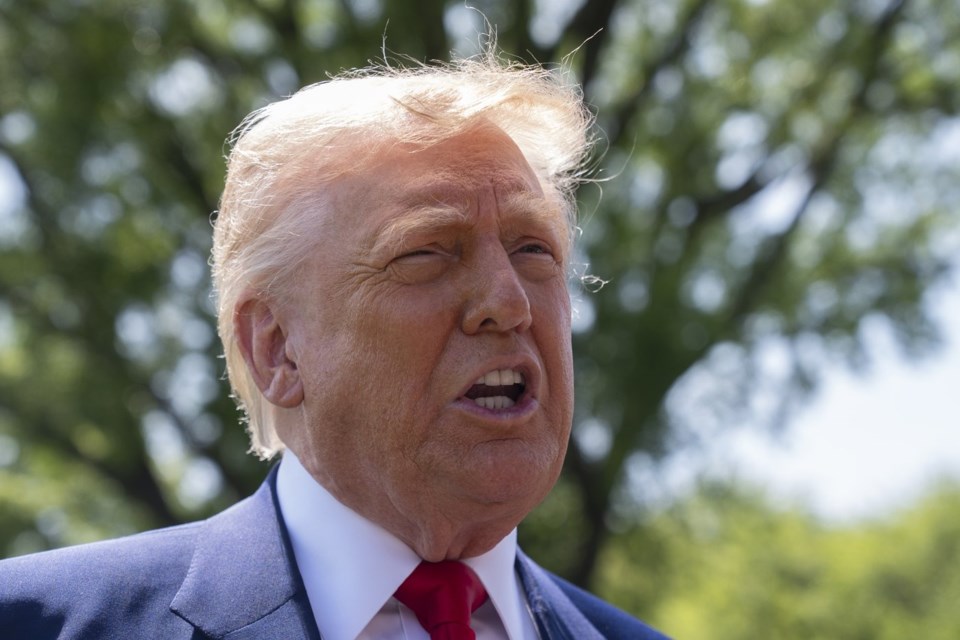WASHINGTON (AP) — The Trump administration has told Congress that it intends to designate Haitian gangs as foreign terrorist organizations, according to people familiar with the notification.
The State Department had similarly labeled eight Latin American crime organizations as it ratcheted up pressure on cartels operating in the U.S. and anyone assisting them, and the new move indicates that the administration plans to put similar pressure on gangs from Haiti. The designation carries with it sanctions and penalties for anyone providing “material support” for the group.
It comes after a series of steps against the Venezuelan gang Tren de Aragua, which was designated a foreign terror organization and then dubbed an invading force under an 18th-century wartime law to justify the deportation of Venezuelan migrants to a notorious El Salvador prison under President Donald Trump’s sweeping immigration crackdown.
According to the notification sent to congressional committees on April 23, the Trump administration said it intends to designate the Haitian gangs Viv Ansamm and Gran Grif as foreign terrorist organizations, according to two people familiar with the message, who spoke on condition of anonymity to discuss details that have not yet been made public.
A third person confirmed the foreign relations committees in the House and Senate received the notification. The State Department did not immediately respond to a request for comment.
The designation follows a Trump administration move in February to nix protections that shielded half a million Haitians from deportation.
The foreign terrorist organization label has typically been reserved for groups like al-Qaida or the Islamic State group, but applying it to Haitian gangs means that the Trump White House is expanding the longstanding U.S. definition of foreign terrorism.
Viv Ansanm, which means “Living Together,” is a powerful gang coalition that formed in September 2023 and is best known for launching a series of attacks starting in February 2024 across Port-au-Prince and beyond that shuttered Haiti’s main international airport for nearly three months, freed hundreds of inmates from the country’s two biggest prisons and eventually forced former Prime Minister Ariel Henry to resign.
The coalition united more than a dozen gangs, including two of Haiti’s biggest ones: G-9 and G-Pèp, which were fierce rivals.
Gangs control at least 85% of Haiti’s capital, with Viv Ansanm attacking once peaceful communities in recent weeks in a bid to control even more territory.
Gran Grif, also known as the Savien gang, forms part of the Viv Ansanm coalition and is led by Luckson Elan, best known as “General Luckson.” It is the biggest gang operating in Haiti’s central Artibonite region with some 100 members.
It was blamed for an attack in the town of Pont-Sondé in October 2024 in which more than 70 people were killed in one of the biggest massacres in Haiti’s recent history.
Gran Grif also was blamed for a recent attack in the Petite Riviere community in which several people were killed, including an 11-year-old child.
Gran Grif was formed after Prophane Victor, an ex-member of Haiti’s Parliament who represented the Petite Riviere community in Artibonite, began arming young men in the region, according to a U.N. report. Victor was arrested in January.
Canada sanctioned him in June 2023, as did the U.S. in September 2024, accusing him of supporting gangs “that have committed serious human rights abuse.”
More than 5,600 people were killed across Haiti last year, with gang violence leaving more than 1 million homeless in the country of nearly 12 million people, according to the U.N.
While much of the violence has occurred in Port-au-Prince, gangs recently struck the city of Mirebalais in Haiti’s central region and freed more than 500 inmates from a local prison. They also attacked the nearby town of Saut d’Eau, considered sacred by the thousands of Haitians who travel there yearly for a Vodou-Catholic pilgrimage.
Gangs also have seized more control in Port-au-Prince, killing more than 260 people in Kenscoff and Carrefour earlier this year. The U.N. political mission in Haiti noted that it took the country’s military, police and a U.N.-backed mission led by Kenyan police roughly five hours to respond to those attacks.
Hunger also has surged to record levels as a result of the persistent gang violence, with more than half of Haiti’s population expected to experience severe hunger through June, and 8,400 people living in makeshift shelters projected to starve.
___
Amiri reported from the United Nations. Danica Coto contributed to this story from San Juan, Puerto Rico.
Michelle L. Price And Farnoush Amiri, The Associated Press




